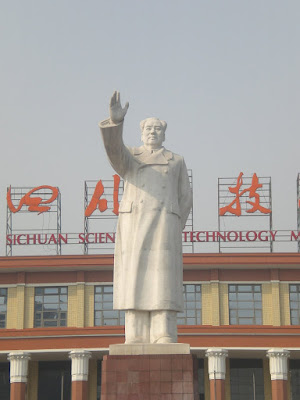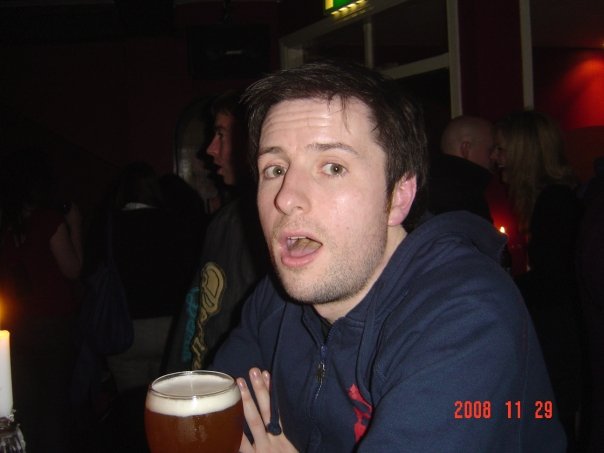Once I felt well enough after
the hotpot incident, we hired some bikes from the hostel and saw a bit of Chengdu by bicycle. City cycling here is completely different to back home, with every street (all of which were flat) having it's own spacious bike lane, and cyclists also have their own traffic lights – the way it should be.

The city tour culminated with me getting my ears cleaned in the traditional Chinese style in a Chinese tea house by the lake of the People's Park. This involved a man with a thin needle and and tuning-fork style instrument operating on my ear whilst around me people drank tea and chatted. This is a normal scene in a Chinese tea house, I assure you. For hundreds of years, the Chinese tea house, essentially the Chinese version of the local pub, is where they go for tea, chat, and ear cleaning. Supposedly having clean ears makes it easier to eavesdrop on the local gossip that gets passed around here, although with my almost non-existent Mandarin this benefit was lost on me.

Tinafu square was the highlight of what we witnessed that day, marking the centre of Chengdu with a large paved open area, with a statue of Chairman Mao ominously watching over it. You could tell that the square was built with the intention of displaying the might of communism, and mightily impressive it was.
Having seen the communist-build heart of Chengdu, that night we ended up in a place where we couldn't feel further from it's pseudo-Puritan idealogy. I had gained a contact in Chengdu through my old boss at DSI,
Brendan Lawlor. He happened to have a Dutch software industry colleague working in Chengdu. So that night we met up with Erik Wiersma, who worked for IJO Technologies, the Chengdu software house who cater exclusively to the Dutch market. Being in the same industry ourselves, it was a natural link-up.

Meeting in the bright and glitzy club and restaurant district, he took us to quite possibly the largest and most spectacular restaurant I had ever eaten in. An enormous statue of an ancient Chinese warrior stood by the door, and the interior I saw was decorated with tasteful and intricately carved wooden wall trimmings and furniture. We sat outside in the garden, and had our first truly delicious Chinese meal whilst chatting about life in Chengdu (it's pretty good by the sounds of it).

From there Erik took us to Soho night club a short walk away. Stepping inside, my preconceptions of China as a developing and old fashioned country were blown away. As modern a night club as I've seen, the neon frenzy inside had numerous stages where male singers and scantily clad female dancers performed their stuff, with cheesy Chinese pop blaring through the soundsystem. With far less dancefloor space than a typical Western club, most club-goers were standing around tables, a large proportion of them playing the dice game we were introduced to that night. I won't bore you with the details of the rules, but essentially if you guess wrong you have to down your ice-tea and whiskey (it's what everyone was drinking – not the nicest combination I've had, but not the worst).
Oh and from what we saw Sichuan girls most definitely do not dress conservatively – more of that please.















